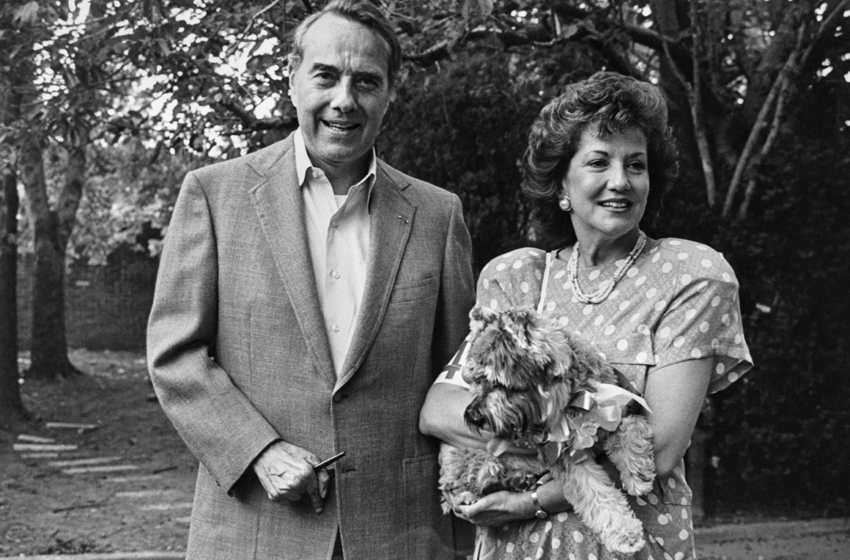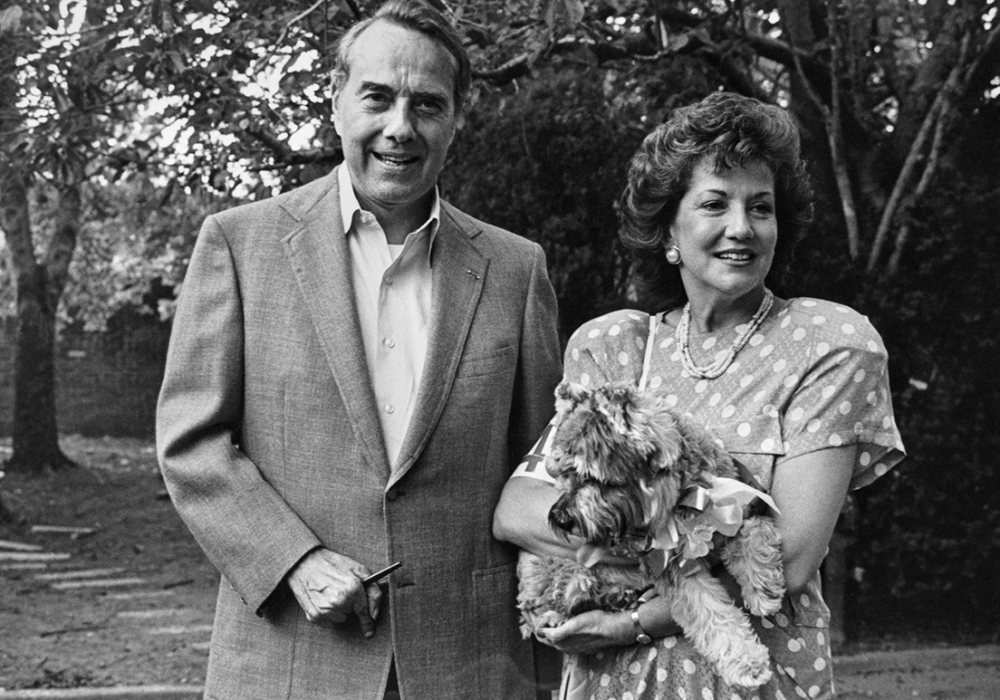Although a staunch conservative who focused on balanced spending, deficit reduction, and foreign policy, Dole was never beholden to the party line during his years in Congress representing his home state. He co-authored food stamp legislation with a progressive icon, persuaded President Ronald Reagan to push through tax increases and commiserated with President Bill Clinton over dealing with Newt Gingrich, the obdurate House speaker, in the 1990s — “No, you talk to him,” Dole would say to Clinton.
Dole later won the Republican presidential nomination and ran against Clinton in 1996, 20 years after he had been the party’s vice presidential nominee in 1976. He lost both times, the only American politician to do so.
President Joe Biden on Sunday praised his former Senate colleague as a friend and “an American statesman like few in our history.”
“Bob was a man to be admired by Americans,” Biden said in a statement. “He had an unerring sense of integrity and honor. May God bless him, and may our nation draw upon his legacy of decency, dignity, good humor, and patriotism for all time.“
The White House later said that the president and first lady Jill Biden had spoken by phone with Elizabeth Dole to “express their sincere condolences.”
Dole was a Washington fixture wary of the trappings of Beltway life. Valued by both sides of the political spectrum, his congressional doggedness once inspired a fellow D.C. pillar and frequent Senate sparring partner, Democratic Sen. Robert Byrd of West Virginia, to break protocol on the Senate floor in 1986 and address Dole directly.
“I have learned a lot from you,” Byrd said. “It is that tenacity and courage and stick-to-itiveness, and yet that good humor and joviality, that help to brighten our day. It is a pleasure to serve with you.”
Dole’s 1996 run for president brought him the most national attention, but his four-plus decades in politics left an imprint on U.S. policies. In fact, by the early 1990s, Dole himself thought he had given all he could to his country. But a 1994 trip to the Normandy beaches on the 50th anniversary of D-Day convinced him to go all in one last time.
“I decided maybe there was one more chance, one more opportunity for service — for my generation — one more mission,” he said later.
Dole resigned his Senate seat in June 1996 with typical bluntness, claiming he had “nowhere to go but the White House or home.” In a show of conservative appeasement, he chose Jack Kemp, a New York congressman and supply-side economics evangelist, as his running mate.
The two made for a dry, if not well-established, odd couple.
Dole was sarcastic, occasionally irascible, and had the weight of 11 years as the Republican Senate leader behind him. Washingtonian magazine dubbed him the member of Congress with the best sense of humor.
Kemp was a technocrat, the force behind a massive 1981 tax cut, then the largest in American history. Dole had criticized the measure as a budget-bloating bill, causing Kemp to retort: “In a recent fire, Bob Dole’s library burned down. Both books were lost. And he hadn’t even finished coloring one of them.”
Washingtonian dubbed Kemp the member of Congress with the worst sense of humor.
Starting early in the campaign, Clinton portrayed Dole as old — the GOP nominee was 73 at the time — and out of touch. In his acceptance speech, Clinton turned around Dole’s Republican convention rhetoric that Dole-Kemp would be a “bridge” to a better America of the past. “We do not need to build a bridge to the past, we need to build a bridge to the future,” Clinton said.
Clinton also tied Dole to the consecutive government shutdowns in 1995 and 1996, even though Gingrich was the tactician behind those maneuvers. And with Dole running on a 15 percent across-the-board tax cut, Clinton tacked to the center after failing to capitalize on several of his 1992 campaign proposals of bold, progressive government programs like universal health care.
But often, people just remember how Dole referred to himself.
“Make no mistake, Bob Dole is going to be the Republican nominee,” Dole said during the primaries.
“Bob Dole won’t veto those bills,” Dole said in the general election.
“I think the best thing going for Bob Dole is that Bob Dole keeps his word,” Dole said in the first debate.
“Gets the name out,” Dole said when asked about his third-person proclivity.
Clinton cruised to victory on his incumbent popularity and a growing U.S. economy, carrying 31 states and the District of Columbia.
Clinton, in a statement on Sunday, said, “I enjoyed our combat, and our cooperation even more.“ He and former Secretary of State Hillary Clinton added: “After all he gave in World War II, he didn’t have to give more. But he did. The power of that example should inspire people in public service today and for generations to come.“
While Dole’s presidential run got his name out to the entire country, he had already spent three-plus decades at the center of most budget, tax and foreign policy discussions. His style was to cobble together piecemeal budget-cutting bills — a few million here, a few million there — caring more about getting the bill passed than strict ideological rigidity.
“Dole always wanted the incremental win,” his former chief of staff, Sheila Burke, said for an oral history project. “‘When was the last time losing ever worked in your interest?’ was his general philosophy.”
She summed up Dole’s mindset: “Never say never until it’s done.”
That attitude was present throughout his life.
In 1942, at the age of 19, Dole left Kansas University during his sophomore year to enlist in the Army, where he rose to the rank of second lieutenant in the Army’s 10th Mountain Division.
On April 14, 1945, with the war winding down, Dole’s division engaged the German army near Castel d’Aiano, Italy. The Americans pushed the Germans off the high ground, suffering more than 500 casualties in the process.
Seeing a downed radioman, Dole struck out to assist the fallen soldier. But German gunfire tore through his back, spinal cord, and right shoulder. For hours, Dole was paralyzed, arms folded, immobile across his chest, drifting in and out of consciousness.
“I guess some German thought I was a good target,” Dole later dryly dictated in a letter to his mother from the hospital.
It was hours before a medic could get to him. And it was three years before he was able to fully leave the hospital, suffering two near-fatal fever spikes, multiple surgeries, a lost kidney and a lost shoulder. He finally departed with a nonfunctioning right arm, only a few working fingers on his left hand and weight loss of more than 70 pounds.
Yet Dole got through law school memorizing lectures from tape recordings he made, unable to take notes. Returning to Kansas, he started him on his four-decade journey in politics. Even into his 80s, Dole continued to show up to the D.C. law firm Alston & Bird in his crisp Brooks Brothers suit, hair combed with a barber comb he carried in his back pocket for decades.
Dole was born at the center of the Dust Bowl in Russell, Kan., the kind of place where in the 1930s people had to constantly scoop dust out of their home.
His parents raised their family in a one-story brick house.
’’Four of us kids and my parents lived in the basement apartment for years so we could get the rent money from renting out the ground floor,’’ Dole recalled in 1985. ‘’My father ran a creamery and a grain elevator. My mother sold sewing machines and gave sewing lessons.”
Dole’s parents had modest upbringings — one of Dole’s grandfathers lost his land during the Great Depression, while the other was a tenant farmer.
’’We don’t come from any money in our family,’’ Dole said. ‘’I’m a little sensitized to people who work hard all their lives and don’t quite make it.’’
As a kid, Dole did work hard — and he always had a plan. Dole was the one who insisted on using the $26 he saved from odd jobs to buy the family a bike so all four children could have paper routes.
He carried that plan over to his time in the military.
“I was young and strong, and had an incredible desire to live,” Dole wrote about his recovery in his 2005 memoir, “One Soldier’s Story.”
He first ran for office just a few years after that recovery, getting elected to the Kansas House of Representatives in 1950. Two years later, he became county attorney in Russell County. The hometown job included a sobering moment that would likely inform his later work on welfare programs: Dole had to sign the papers for his grandfather’s welfare check each month.
’’A hard thing to do,” he recalled three decades later.
In 1960, Dole was elected to the House of Representatives, moving his career to Washington. In 1968, he won a seat in the Senate, soon becoming a Republican Party leader.












